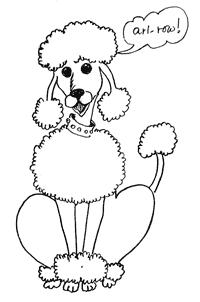Doggerel: Pups' yips say it all

DRAWING BY DEBORAH DERR McCLINTOCK
Q. Some dogs come doggone close to talking. How close? –Snowy
A. Beyond barks and growls, there are plenty of vocalizations intended to communicate with humans, says psychologist Stanley Coren in The Intelligence of Dogs. A soft whimpering– a carryover of a puppy's mewing when cold or hungry– when at the vet's means "I hurt!" or "I'm scared." Louder, more prolonged whining usually says "I want," maybe food or a walk. Ayip-yip-yip-howl: "I'm lonely." Full howling: "This is my territory!" Panting: "Let's go." Moaning, as in ar-owl-wowl-wowl: "I'm excited!"
Closer still are those specific learned vocalizations, such as the bark dogs give to the command to speak, sounding qualitatively different from any spontaneous bark. There are also play-growls, complex yodels, and even attempts at speech, says Coren.
Psychologist Janet W. has a poodle, alone much of the day, that she greets in the evening with a cheerful, sing-song "hello." "After a while, the dog learned an imitative two-syllable 'arl-row,' which it now gives spontaneously in greeting when family members enter the house. This vocalization, however, is reserved for family and never given to strangers," she says.
Q. If you believe in good luck, does that mean you're more likely to have it? Juan Duckee
A. No dice. Studies show no difference in how the self-described "lucky" do at gambling or games compared to anyone else, says psychologist Dr. Richard Wiseman in The Luck Factor. In other words, feeling lucky won't influence the cards, dice, or lottery computer one bit. But there's a subtler side to good fortune in that feeling lucky can become a self-fulfilling prophecy in areas such as relationships, careers, and health.
To test this, Wiseman planted a five-pound note outside a British coffee shop where "lucky" Martin and "unlucky" Brenda were to meet a researcher. Martin arrived first, picked up the note and sat next to a businessman, offering to buy him coffee. After Martin left, Brenda arrived, and though another note had been placed, she walked right over it and sat next to the businessman without speaking.
Later, when the two were asked if anything lucky or unlucky had happened that day, Martin told of the money and chat; Brenda had nothing to report.
Says Wiseman, those who feel lucky smile more, have a broader network of friends, and take better advantage of opportunities. They stay relaxed, play their hunches, and see the positive side even when ill-fortune strikes, whereas the unlucky are more defeatist and superstitious. So to some degree the lucky make their own luck.
Now, don't you feel luckier for having read this?
Q. Try this one out on your pub friends: If you ride a bike at a constant speed and toss a ball straight up in the air, will it land a) behind you and the bike? b) in front of you? c) on top of you? –L. Armstrong
A. When Len Fisher tried this, described in his How to Dunk a Doughnut, most pub-mates picked a), believing the ball would land a distance behind. So Fisher led everyone outside and did the experiment: The small stone he tossed kept pace with him and conked him directly on the head. "I was glad that it hadn't been a cricket ball or a baseball," he says.
Usually the object will land beside the rider because its horizontal speed is independent of its vertical speed, so it just continues forward at the original rate. An even more dramatic demo of independent velocities is a rifleman who fires a bullet horizontally while simultaneously dropping a second bullet from the hand supporting the rifle. Says Fisher, both the fired and dropped bullets will hit the ground at about the same time!
Send Strange questions to brothers Bill and Rich at .
#